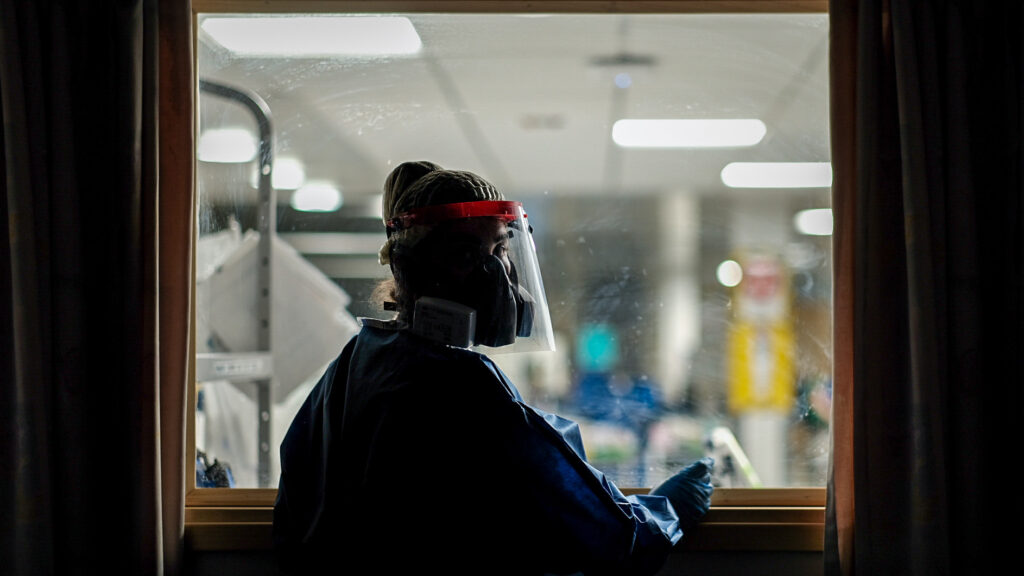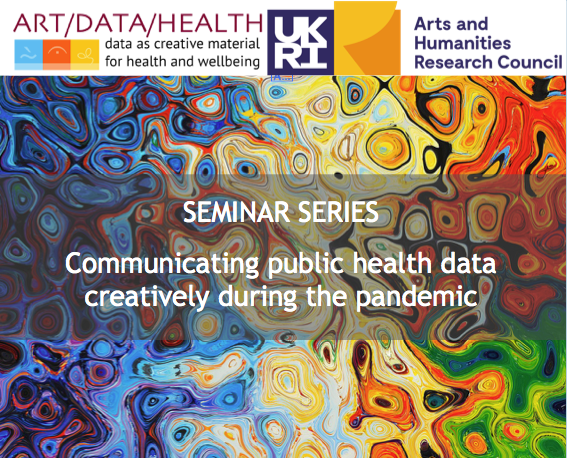
Join us in this exciting online seminar series, where international speakers explore how health data have been communicated during the COVID-19 pandemic, focusing on creative and artistic representations of quantitative data. The series includes perspectives and approaches to data from bioart, community art, participatory dance, media art, film and more traditional data viz, such as infographics, which were explored during the two years of the ART/DATA/HEALTH project.
Programme
30/03 Anna Dumitriu. “Creating meaning from healthcare data through art”. BOOK YOUR PLACE HERE
01/04 Prof Rahul Bhargava Northeastern University “”Get off the screen!!! Creative approaches to embodying data in the real world”. BOOK YOUR PLACE HERE
09/04 Dr Younghui Kim, Queensland University of Technology. “Data art: Exploring data as artistic material and medium”. BOOK YOUR PLACE HERE.
12/04 Prof Sally Wyatt, Maastricht University. “Touching Data: touch me with your naked hand or touch me with your glove”. BOOK YOUR PLACE HERE.
14/04 Dr Shreepali Patel, Meghan Horvath & Dr Marques Hardin (StoryLab project, Anglia Ruskin University). “Communicating Emotions Through Creative Data: Voices of Healthcare Practitioners during Covid-19″. BOOK YOUR PLACE HERE
20/04 Launch of ART/DATA/HEALTH short film “Human, Planet, Weaker, Other”, directed by Dr Aristea Fotopoulou, animation by Caroline Beavon, Filming by Hydrocracker.
Abstracts
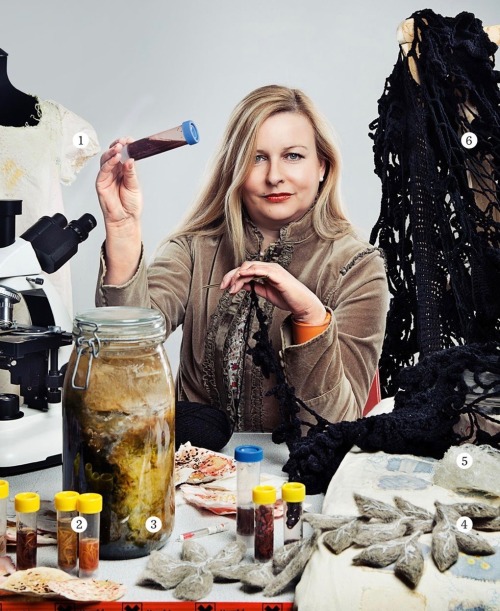
30/03 Anna Dumitriu. “Creating meaning from healthcare data through art”. BOOK YOUR PLACE HERE
Abstract
In this talk, the bioartist Anna Dumitriu will discuss how she works with data in her artworks to reveal stories around infectious diseases, synthetic biology and genomics, and well as robotics, artificial intelligence and emerging digital technologies. Equally at home in bioscience and technology settings as the art studio, Dumitriu gives an insight into new artworks created in the shadow of the COVID-19 pandemic, including
- “Susceptible” which focusses on new innovations in global health and tuberculosis genomics,
- “Shielding” (commissioned by ART/DATA/HEALTH) which looks at the impact of the COVID-19 lockdown on victims of domestic abuse and is embedded with a SARS-CoV-2 RNA construct, and
- “Cyberspecies Proximity” a robotic artwork exploring how we will share future cities with intelligent robots.
Her work is frequently inspired by the history behind research, situating contemporary issues within cultural contexts, weaving narratives and telling stories and drawing threads across time.
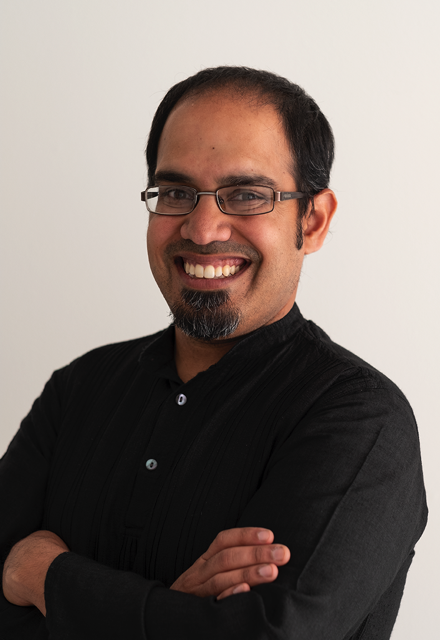
01/04 Prof Rahul Bhargava Northeastern University “”Get Off The Screen!!! Creative Approaches To Embodying Data In The Real World”. BOOK YOUR PLACE HERE.
Abstract
In this talk, Prof Rahul Bhargava (Northeastern University) asks:
- Why is data so often trapped on our 2-dimensional screens?
- Why do we default to simple charts to show it?
Our toolkit for bringing people together around data in civic health settings is far too limited. Rahul will discuss alternative approaches that build on the language of the arts, meeting people where they are, in formats they understand. Participatory theatre, community murals, public art installations – these techniques build a more appropriate toolbox for communicating with health data. Rahul will share examples from his work, and the underlying pedagogy behind it. You’ll walk away with a rich set of inspirations and concrete approaches you can integrate into you arts, health, and data practices.
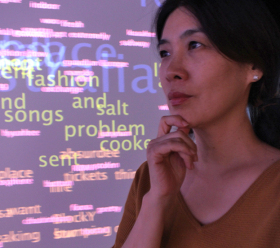
09/04 Dr Younghui Kim, Queensland University of Technology. “Data art: Exploring data as artistic material and medium”. BOOK YOUR PLACE HERE.
Abstract
“Data can be viewed differently depending on how we collect, frame, and interpret. Especially, data can reveal stories with social issues embedded in them when seen through artistic exploration.”
Many of us are living in data-saturated societies where our everyday actions, opinions, and environmental status are being digitally traced. These data certainly open up new opportunities to develop new products or inform the decision-making of new policies. In parallel, data provide a rich context for contemporary artists to explore personally, socially, and politically. Among the critical concerns of data such as under-representation, data bias, privacy issues, unequal access, and data transparency, I artistically explored under-represented data – left-out data as outliers – by acknowledging layers of data bias through my art practice.
In this talk, I will present the findings from my research on data art by seeing data as an artistic material and medium. Then, I will discuss the layers of bias and how I embrace the idea of subjectivity, bias, and the need for diverse representations of data, especially through my creative practice of the artistic exploration of data.
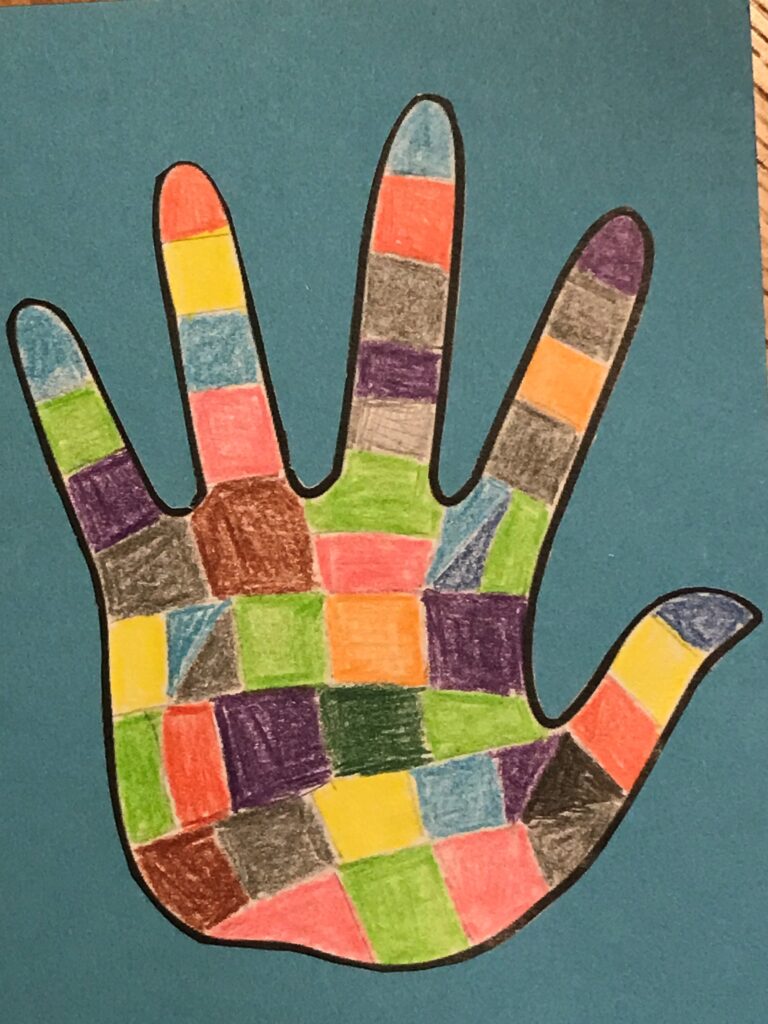
12/04 Prof Sally Wyatt, Maastricht University. “Touching Data: touch me with your naked hand or touch me with your glove”.
Abstract
Over the past year, many of us have brushed up our data interpretation skills, trying to make sense of excess mortality, reproduction numbers, absolute numbers of infections, percentages of those tested, reported numbers, and calculated numbers. We have been confronted with different kinds of visualisations, including trend lines, bar charts, and maps, often deployed for political ends. There is much to be said and analysed with and about these data by statisticians, epidemiologists, critical data studies scholars, and artists. In this short presentation, I will take a different approach to data and will share some details of an activity done with colleagues in the Netherlands and Canada, during the summer of 2020. Our activity was inspired by the Dear Data project [THE PROJECT — Dear Data (dear-data.com)] of Giorgia Lupi and Stefanie Posavec. We focused on touch. Corona symptoms include loss of the senses of taste and smell. But much of the official advice, certainly in the early weeks of the pandemic, warned us to keep physical distance, not to touch other people and certainly to wash our hands thoroughly after every encounter with potentially virus-carrying surfaces and objects. Indirectly, the corona virus has also affected our sense of touch. That is what we explored in our collective project. During the presentation, I will share details of the activity and some of the data and their visualization that we produced. This is very much work-in-progress. During the discussion we would welcome both feedback and suggestions for future collaboration.
Calgary-based colleagues: Ariel Ducey, Martina Kelly & Pratim Sengupta
Maastricht-based colleagues: Anna Harris, Candida Sanchez Burmester & Andrea Wojczik
*Leonard Cohen: Dance me to the end of love (1984)
